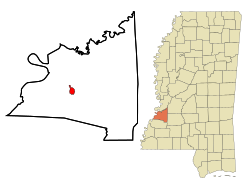Port Gibson, Mississippi | |
|---|---|
 Claiborne County Courthouse and Confederate monument in Port Gibson | |
| Motto: "Too beautiful to burn" | |
 Location of Port Gibson, Mississippi | |
| Coordinates: 31°57′22″N 90°58′59″W / 31.95611°N 90.98306°W | |
| Country | |
| State | |
| County | Claiborne |
| Government | |
| • Mayor | Willie A. White |
| Area | |
• Total | 1.75 sq mi (4.55 km2) |
| • Land | 1.75 sq mi (4.55 km2) |
| • Water | 0.00 sq mi (0.00 km2) |
| Elevation | 118 ft (36 m) |
| Population (2020) | |
• Total | 1,269 |
| • Density | 723.08/sq mi (279.18/km2) |
| Time zone | UTC-6 (Central (CST)) |
| • Summer (DST) | UTC-5 (CDT) |
| ZIP code | 39150 |
| Area code | 601 |
| FIPS code | 28-59560 |
| GNIS feature ID | 0676254 |
| Website | portgibsonms |
Port Gibson is a city and the county seat of Claiborne County, Mississippi, United States. The population was 1,567 at the 2010 census.[2] [3] It is bordered on the west by the Mississippi River.
The first European settlers in Port Gibson were French colonists in 1729; it was part of their La Louisiane. After the United States acquired the territory from France in 1803 in the Louisiana Purchase, the town was chartered that same year. To develop cotton plantations in the area after Indian Removal of the 1830s, planters who moved to the state brought with them or imported thousands of enslaved African Americans from the Upper South, disrupting many families. Well before the Civil War, the majority of the county's population were enslaved.
Several notable people are natives of Port Gibson. The town saw action during the American Civil War. Port Gibson has several historical sites listed on the National Register of Historic Places (National Register of Historic Places listings in Claiborne County, Mississippi).
In the twentieth century, Port Gibson was home to The Rabbit's Foot Company. It had a substantial role in the development of blues in Mississippi, operating taverns and juke joints now included on the Mississippi Blues Trail.
In the second half of the twentieth century many jobs in agriculture were lost because of industrialization, which, combined with a lack of other jobs, has led to a substantial loss of population and to poverty in the city and the surrounding county. Port Gibson's population peaked in 1950. The last major employer, the Port Gibson Oil Works, a cottonseed mill, closed in 2002.
- ^ "2020 U.S. Gazetteer Files". United States Census Bureau. Retrieved July 24, 2022.
- ^ "Profile of General Population and Housing Characteristics: 2010 Demographic Profile Data (DP-1): Port Gibson city, Mississippi". United States Census Bureau. Retrieved March 28, 2012.
- ^ "Find a County". National Association of Counties. Retrieved 2011-06-07.

